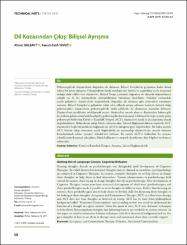| dc.contributor.author | Nalbant, Ahmet | |
| dc.contributor.author | Yavuz, Kaasim Fatih | |
| dc.date.accessioned | 2020-02-26T06:21:42Z | |
| dc.date.available | 2020-02-26T06:21:42Z | |
| dc.date.issued | 2019 | en_US |
| dc.identifier.citation | Nalbant, A. ve Yavuz, K. F. (2019). Dil kozasından çıkış: Bilişsel ayrışma. Bilişsel Davranışçı Psikoterapi ve Araştırmalar Dergisi, 8(1), 58-62. https://doi.org/10.5455/JCBPR.33709 | en_US |
| dc.identifier.issn | 2146-9490 | |
| dc.identifier.uri | https://doi.org/10.5455/JCBPR.33709 | |
| dc.identifier.uri | https://hdl.handle.net/20.500.12511/4951 | |
| dc.description.abstract | Psikoterapilerde düşüncelerin doğrudan ele alınması, Bilişsel Terapiler’in gelişimine kadar ihmal edilen bir konu olmuştur. Psikopatolojiye katkı sunduğu öne sürülen ve çarpıtılmış ya da irrasyonel olduğu ifade edilen bazı düşünceler, Bilişsel Terapi içerisinde doğrudan ele alınarak değiştirilmeye çalışılır ya da bu düşüncelerin alternatiflerinin bulunması hedeflenir. Psikoloji tarihindeki çeşitli gelişmeler, düşüncelerin değiştirilerek doğrudan ele alınması gibi yöntemleri tartışmaya açmıştır. Bilişsel Terapiler’in gelişimini takip eden yıllarda ortaya çıkmaya başlayan üçüncü dalga psikoterapiler, düşüncelerin psikoterapilerde farklı şekillerde ele alınmasını mümkün kılmıştır. Düşüncelerin içeriklerine odaklanmak yerine, düşüncelere mesafe alma ve düşüncelere bakma gibi becerilerin gelişmesinin hedeflendiği bu psikoterapilerden kuramsal ve bilimsel desteği en önde gelen psikoterapi ekolu olan Kabul ve Kararlılık Terapisi (ACT), düşünceleri hatalı ya da çarpıtılmış olarak değerlendirmez. Kökenlerini aldığı felsefi yaklaşım olan ‘İşlevsel Bağlamsalcılık’tan hareketle ACT, düşünceleri bağlı bulundukları bağlamda ne işlevleri olduğuna göre değerlendirir. Bu bakış açısıyla ACT, kişinin takip etmesinin çeşitli bağlamlarda işe yaramadığı düşüncelerine mesafe almasını kolaylaştırmak adına ‘ayrışma’ tekniklerini kullanır. Bu yazıda ACT’te kullanılan bu ayrışma tekniklerinin kuramsal arka planı, klinik kullanımı ve ampirik desteklerine dair bilgileri özetlemeye çalışacağız. | en_US |
| dc.description.abstract | Treating thoughts directly in psychotherapies was disregarded until development of Cognitive Therapies. So-called distorted or irrational thoughts that are claimed to contribute psychopathology are subjected to Cognitive Therapies. In sessions, cognitive therapists try to help clients to change those thoughts or help them to find alternatives. Various advancements in psychotherapy field started discussions about trying to change thoughts directly in psychotherapy. After development of Cognitive Therapies, recent years have witnessed development of ‘third wave’ psychotherapies and those psychotherapies made it possible to treat thoughts in different ways. Rather than focusing on content, these psychotherapies aim to help clients to develop skills for distancing from thoughts or for looking at those thoughts. Acceptance and Commitment Therapy (ACT), is a third wave therapy and ACT does not treat thoughts as distorted or wrong. ACT has its roots from philosophical background called “Functional Contextualism” and according to this, one needs to understand the function of a thought in a given context. From this point of view, ACT uses ‘defusion’ techniques to help clients distancing from thoughts that following them is not workable in various contexts. In this paper, we tried to summarize defusion techniques with their theoretical background and we also gave examples of how to use them in therapy room and mentioned about their scientific support. | en_US |
| dc.language.iso | tur | en_US |
| dc.rights | info:eu-repo/semantics/openAccess | en_US |
| dc.subject | Kabul ve Kararlılık Terapisi | en_US |
| dc.subject | Ayrışma | en_US |
| dc.subject | İşlevsel Bağlamsalcılık | en_US |
| dc.subject | Acceptance and Commitment Therapy | en_US |
| dc.subject | Defusion | en_US |
| dc.subject | Functional Contextualism | en_US |
| dc.title | Dil kozasından çıkış: Bilişsel ayrışma | en_US |
| dc.title.alternative | Getting out of language cocoon: Cognitive defusion | en_US |
| dc.type | article | en_US |
| dc.relation.ispartof | Bilişsel Davranışçı Psikoterapi ve Araştırmalar Dergisi | en_US |
| dc.department | İstanbul Medipol Üniversitesi, İnsan ve Toplum Bilimleri Fakültesi, Psikoloji Bölümü | en_US |
| dc.authorid | 0000-0003-3862-2705 | en_US |
| dc.identifier.volume | 8 | en_US |
| dc.identifier.issue | 1 | en_US |
| dc.identifier.startpage | 58 | en_US |
| dc.identifier.endpage | 62 | en_US |
| dc.relation.publicationcategory | Makale - Ulusal Hakemli Dergi - Kurum Öğretim Elemanı | en_US |
| dc.identifier.doi | 10.5455/JCBPR.33709 | en_US |


















